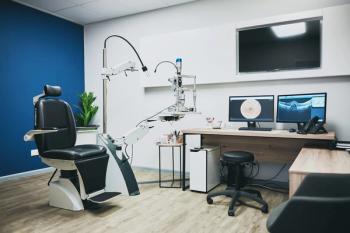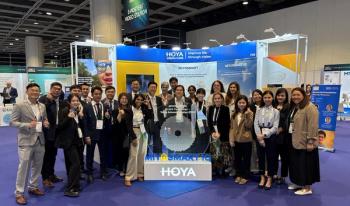
Q&A: Carla Mack, OD, MBA; Director of Professional and Clinical Support, for U.S. Vision Care at Alcon
Contact lenses, communications, and knowing how to properly bill and code
Were you always interested in optometry?
I had been interested in optometry from a young age, about the time I was 12. However, my earliest memory is about the time I was three when I started understanding that I had interest in a medical career. So, even as a very young girl I would talk about nursing or when I would play it was always about taking care of people. I grew up in a very small town east of Cleveland called Middlefield where I didn’t have good female career women around me to let me see that this is an option.
Why contact lenses?
My interest in contact lenses began when I was working at The Ohio State University running our student health clinic. It was amazing to me the number of seemingly healthy students who for the most part were noncompliant with wear and had unhealthy lifestyles in general. I used to see all kinds of very interesting cases that came in, and of course we had a lot of contact lens wearers. So, my interest really sparked during that time when I started to learn a lot more about contact lens wear and the impacts it has on people.
Have you always been interested in communications and writing?
It’s developed over time. I thought I would have my own private practice coming out of optometry school. I didn’t do that-I went right into working at OSU. While there you teach, educate, and write. A mentor of mine, Joe Barr, got me into writing for trade journals, and you pick up how you communicate via written words. My interest in this medical communications area came about over time. When I went to work for Bausch + Lomb, I oversaw their publications strategy and took on a big part of the global medical communications outreach. My interest stems from my interest in educating and in getting points across in a clear and concise way.
Why academia?
I fell into academia. When I finished my ocular disease residency, I had my first child about a week later. And so I took a few months off after that. I was looking for the right place of employment. I visited a number of private practices and nothing felt right. I wanted to be at a place that I wanted to be at for a while. One of these part-time things was at the OSU College of Optometry where they were trying to expand their student health center optometry outreach at the time. We took it from a couple of half-days a week when it first started to five days a week. Once I was there for a few years and building that clinic, I became more active in all the other things that go along with academia, such as teaching and research. It wasn’t something I proactively pursued but something I found that really loved.
What’s something your colleagues don’t know about you?
I’m a fairly open book. I really truly love to work out, so when people ask me what I’m doing on the weekend, it’s generally getting things caught up for the house for the weekend as well as getting all my workouts in. I box, I do Hatha yoga, and other classes that include weights. It’s a passion of mine to stay fit and healthy and live a well-rounded life.
What attracted you to industry?
I think the first attraction was to get my MBA. That really opened my eyes to a whole new world out there. You know, there’s a basic business acumen, and it’s very much common sense. But it was good for me to have the grounding in that and basic understanding of things that helped me with my job then at OSU and to begin looking at other opportunities that may be out there in industry for me.
How challenging was the transition from academia to industry?
I had some very good contacts in industry. I think every place you work has a culture unto its own. You adapt to that culture, or you don’t. I was not as hard as I expected but at times it probably was. I went into it with pretty open eyes, and I know I had a steep learning curve. Even being in a different organization today at Alcon, it’s a very different organization than where I was previously. Functioning as an optometrist in a private setting vs. being an optometrist in an industry setting-they’re very different. They’re worlds apart. But if you’re somebody like me who loves to learn all aspects of what we do as eyecare professionals and how we show up as an industry, it’s fascinating.
How do you keep a work/life balance?
Some of us have perfectionist mentalities and you have to think about what you’re working on and how long it should take and manage your time in that way. And work is definitely one part of our lives-we have to think outside of that box and truly own all the other aspects of our lives from our families to focusing on ourselves, our own health, and the other activities that we like to do. I think that makes for a much a happier individual. When you love what you do, it makes your work more a part of your life in general so that it’s not work, it’s not something that you get up and you don’t want to do. I think you grow and learn as you get older. There are times I know I worked way too much, probably to the detriment of things at home. You learn from that, too. But I think it’s part of the learning and growing process. You don’t get everything right the first time.
How do you see professional relations changing over time?
Professional relations is different in every company. The true art behind that is that you are the liaison to your professionals out in the field and it’s your responsibility to bring in their insights and to represent them well inside the company. The way I see it changing, and it’s been changing over time, is that we have compliance rules that we all abide by. Every company takes a slightly different look at those and interprets them in slightly different ways, but they’re very important. We want to make sure that we’re doing everything that we can to not influence our peers in an undue way and to make sure that we’re having appropriate interactions.
Do you have any regrets?
I don’t feel like I have any regrets. You can look back on your career and your life and say, “I wish I had done this” or “I wish I had done that,” but there’s generally a reason why you did or didn’t. I assume there’s a regret here or there, but part of that might just be your own growth and maybe your own stupidity at certain times. [Laughs] The thing I try to do the most, especially with my own kids, is choose something that you want to do, that you love to do, and stay on that path. It might take you in different directions, in directions that are far different than what you thought going into things-and don’t put so much pressure on yourself. I think a lot of those things come about over time. Trying to plan your life out too much is one of the things that you can’t do. You have to let life come as it does, but make sure that you’re driving it in the direction you’d like to drive it, right? Certainly you have to take the reins, but you can’t hold them too tight where you don’t allow yourself to see other possibilities.
What’s one thing you would change about optometry as it stands now?
One of my long term beefs is understanding the importance of what we do and the value of what we provide as optometrists. Part of that value is understanding coding and billing. There’s value in what we do, and optometrists still give away things way too much. It’s having a true understanding of the coding and billing system and making sure you abide by those rules, which is better than ignoring them and not charging for things.
What’s the craziest thing you’ve ever done?
Deciding to go back to school mid-career. It was at a time in my life when I had a lot going on personally and professionally and trying to fit that in was very difficult. It came about very quickly. It came into my mind, I looked it up online, I went home to my family and said I’m going back to school. It was almost like I did before I could allow myself to think about what I was getting into. I knew it was right, but if I allowed myself to focus on it too much I could probably talk myself out of it. It’s been one of the things I’m proud of, but if I’d thought too much about it I probably wouldn’t have done it.
Newsletter
Want more insights like this? Subscribe to Optometry Times and get clinical pearls and practice tips delivered straight to your inbox.





























